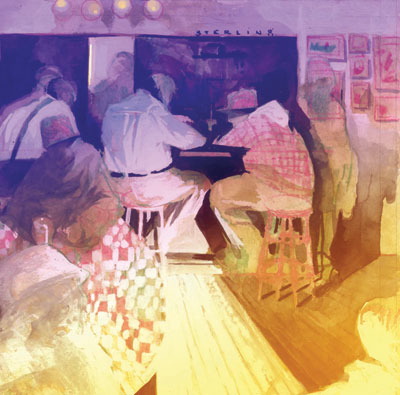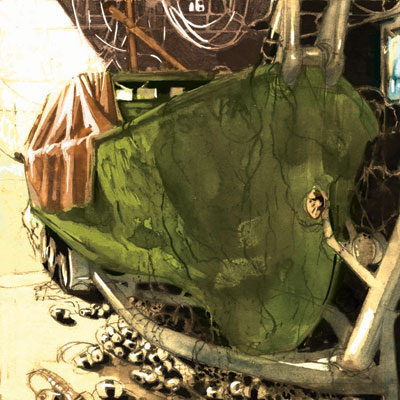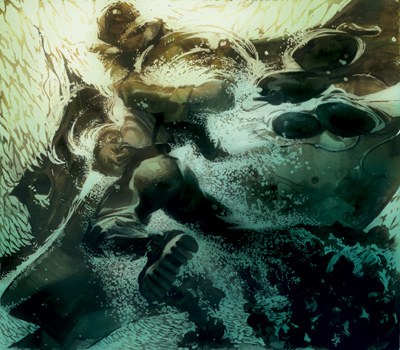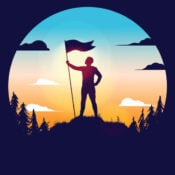It was February when I finally went back to Bay Point on the Washington State coast. I felt my neck and shoulders tighten when I drove through the logging town of Raymond, where high stacks of bruised Douglas fir trunks, soaked black in the constant rain, waited shipment to Japan. Getting close now, it felt like returning to the scene of a crime. But my only crime that day had been stupidity.
South of Raymond on Highway 101 the forested hills opened out to give a view of salt marsh. The smell of the sea laced the pungency of fir needles. Habitation thinned out. My old pickup camper’s wipers made a monotonous beat. The radio got only static. Clouds marched in off the Japanese Current low enough to snag on the coast range. Wind gusts swayed my camper. Repeated bridges offered glimpses of the Pacific. I was counting bridges now.
All my life I have sought these marginal places where land and water and sky meet. Life boils down to simple things: Will the ducks be there, will the wind be right, and will the ducks decoy? No telephones, no deadlines, no tight white collars. Usually I sought these remote places alone, but I hadn’t been alone the day I was stupid. I hadn’t hunted ducks since that day. The road curved through one final stand of second-growth fir and onto the bridge I was looking for. Downstream, the tide was full, marshes covered by the wide bay. I shuddered, remembering.
At the south end of the bridge, the causeway to Bay Point led off at right angles to the highway. The road sign said two miles. Bay Point itself consisted of maybe a hundred weathered houses and corroded mobile homes around a small mooring basin. Low sheds lined the basin. The tied-up fishing fleet bobbed and clanked nervously on wind waves coming around the breakwater. A handful of men in foul-weather gear worked among the boats. I felt them watch me out of the corners of their eyes, the way residents of remote places do strangers. My shoulders got tighter. I was looking for a particular boat. A bright pea-green bowpicker. I had seen it only one time in my life, the day I was stupid out on the bay, but I knew I would recognize it anywhere.
It wasn’t in the boat basin.
You don’t just get out and brace the locals with your questions in a place like Bay Point. At least I don’t. The gulf between your worlds is too enormous. I have hunted near such isolated communities nearly half a century. In all that time I exchanged fewer words with their inhabitants than one typical day in an office. But the pressure of my purpose was on me. I drove to the one tavern in town.
It occupied a small, gloomy former 1930’s gas station. There was one lighted beer sign in the window. A few Formica tables, a jukebox, a short, wooden bar along one wall. Maybe half a dozen people watched me come in, and they all had stopped talking by the time I picked a barstool. I was wearing my old, olive-drab Filson mackinaw and khaki pants, but they knew I was an outsider. The bartender was a woman with a broad, closed face and guarded eyes. She gave me a Budweiser and change and went away. I felt somebody sit at the other end of the short bar.
“You ain’t from around here, are you?” Nasal challenge, like a B-Grade Western from my childhood.
I looked up then. He was a slope-shouldered, older guy with a fat, guileless face. Of course I had to draw the local snoop right off.
“No,” I said. Any talking feels like too much talking in a place like that.

“You looking for somebody?”
An invasive question, slightly hostile. Outsiders seemed to spell trouble here.
“I’m looking for a guy who owns a boat,” I said.
His wattles shook when he cackled. “Lots of guys own boats here, Mister. Them and the bank! You repossessing a boat?”
“No, I want to buy the guy who owns this particular boat a beer. He helped me out of a jam out in the bay. On those islands up there.”
“Yeah? What was you doin’ up there?”
“Hunting ducks.”
He relaxed a little. “You do any good?” The eternal question of the hunter.
“We damn near drowned. Would have, if it hadn’t been for this guy.”
He sidled closer across the stools, interested now. “Sounds like a story to me.”
Everybody in the place seemed to be listening, too. It was an opening that might lead to the man I had come to find. So I told him my story. …
“There were five of us that day, out in the gray, wintry dawn on what seemed like the edge of the world. We could hear the boom of the surf from the Pacific. At low tide the serpentine coils of the river that flowed out of the densely forested hills were invisible below undulating humps of bay mud and marsh grass. There was no traffic on the 101 bridge. At the foot of the boat launch beneath the bridge the dark water had begun to lap higher as the tide turned when I backed my big old camouflage-painted duck boat down the ruts. The rain drifted like smoke, blurring distances. My old 20-horse Mercury turned over easily. Its only purpose in life was to take me duck hunting, and back again safely. I pampered it with regular service, it slept in the garage between seasons, and always did as asked. I had no way of knowing its dependability would be of no help on this day.
“I had hunted this river in the more prudent upstream marshes, and done very well. Dan usually hunted the pair of low islands out in the open bay below the bridge. He said the shooting out there warranted the extra exposure to the elements. So that day, I ferried him and my son out to the islands. Topped with marsh grass, the islands were separated by a mud bank maybe 30 yards wide. Dan and Beau built a blind on the seaward island while I went back for Bob and Bob Junior. It was to be Bob Junior’s first duck hunt, my son’s third. Beau hadn’t killed a duck yet. With the quick impatience of youth he was beginning to wonder if he ever would.
“The four of them set four dozen lightweight decoys on their anchors on the mud while I worked out of the boat alone, setting trawls of my heavy, handmade cork decoys farther out. There were vast rafts of loafing widgeon not a half a mile out to sea. Even in the washed-out light, the white wing patches of the drakes bloomed brightly when they flapped. The tide was making steadily now. The ducks would follow it in to feed. The tide would cover the exposed mud around us just at shooting time. It seemed a perfect setup.
“Birds began to move right on time, but the first ones flared off our 70-decoy set. Dan said my boat, beached on the mud below our blind, was the cause. I had killed the wariest waterfowl—Canada geese, late-season sprig, and adult snow geese—out of that boat. And I grew up on the salt, where my personal rule is that you should always be within reach of your boat. But Dan was the host that day, so I deferred to his judgment and moved the boat to the far end of the second island. Bob Senior grinned at me as I waded back across the ankle-deep slough separating the islands. We worked together and had been through some tense bureaucratic times. He knew my temper and tendency to stand my ground. Now, he seemed to be silently congratulating me for not interrupting the harmony of the hunt.
“We let the boys shoot first. Bob Junior and Beau managed to take a pair of widgeon drakes out of a decoying flock. My Labrador, a winter dog named Summer, bounced out and collected. But the birds continued skittish. I clipped down a mallard drake at long yards with my left-hand barrel. Summer chased it clear out of sight across the widening water toward the Bay Point causeway. Came back with it, triumphant. She was a hunting fool. By then the boys were chilled. Beau and I started back to the boat to get the vacuum bottle of hot chocolate.
“The slough between the islands had deepened. Toward the center, the water was inches from my hip-boot tops. I could go ahead and soak myself or wait another hour until the turn of the tide. My second rule of cold-weather duck hunting is to avoid a soaking if at all possible. So I elected to wait.
“That was my second mistake that day. The tide didn’t turn at the appointed hour. It just kept coming.
“We told the boys to watch the logs floating upriver. When they paused, the tide would be full. When they began to drift back downstream, it soon would be time for hot chocolate. After what seemed like an awful long time, Bobby mentioned that the logs still were racing upstream awfully fast, and he was right. By then, the water was up to the highest point on our island, lapping at the skirts of our camouflage netting. Before too long we were shin deep. Within another half-hour, there were no visible islands anymore. We stood in the center of a wide, uninterrupted expanse of water from the forested slopes to the causeway, dimpled by the driving rain. We ignored the ducks after that.
“Dan had chest waders. He made a try for the boat. Long before the slough could suck him down he was to the top of his waders. It seemed any direction he moved would take him deeper. We all stood perfectly still, the adults looking at each other without comment. There seemed nothing left to say. There was no point using fancy words like hypothermia to try to hide the gravity of our situation from the boys. Both were proud graduates of state hunter-safety courses. They knew we were in serious trouble, but talked to each other in matter-of-fact tones. They began to shiver when they told us the water was over the tops of their hip boots …”
The bartender slammed her cash register drawer, hard. It jerked me back to the present.
“I won’t hear any more of this. I can’t. Anybody want anything, get it yourself.”
She went into the back room through ratty bead curtains. A door slammed back there, harder than the cash register.
“S’okay, Mister.” My listener leaned forward, still caught up in the story. “Molly gets like that. She’s entitled.” I hadn’t lost any of the rest of my audience either. “Them islands are dangerous as hell. Everybody around here knows it. What happened next?”
“The water kept inching up our bodies.
“My thinking seemed to slow down. ‘Just wait it out,’ I kept telling myself. The tide has to turn. We were 90 minutes past the tide-table high. Bob and I held our sons close, bracing them. I remembered that awful old joke about the devil coming through in a motorboat. I hoped the devil had other business today. My real fear was that waves from the sea would start rolling more deeply into the bay, or that the wind would rise.
“My old duckboat floated silently higher than our heads now, not a hundred yards away.
“One of the boys suggested we fire signal shots. Our measured shots brought no response. But still we cradled our guns, in case someone came along. That’s what I told myself. But I just couldn’t bear to surrender the LeFever to the salt. I held Beau’s little H&R Topper, too. Surrendering the guns would somehow be surrendering hope.
“Beau wanted to swim for the boat, supremely confident of his ability to make it. I was afraid he was too cold to clamber over its high sides, or crawl up over the motor. Not strong enough to crank the motor if he did make it. But mostly I couldn’t bear the thought of watching him go under, beyond my ability to reach. I belatedly realized Summer had vanished. She had been swimming a steady orbit around us, evidently unconcerned, for a long time. But none of us had seen her go.
“At first I didn’t hear the voice, calling across the water.
“ ‘There’s somebody there,’ Bob said. ‘On the causeway.’
“I looked through the steady rain. A man stood on the edge of the road.
“ ‘Do you need help?’ I heard him then.
“ ‘We can’t reach our boat,’ I yelled. ‘We have children out here.’
“ ‘Hold on,’ came back the words. ‘Just hold on.’ Then he was gone behind another veil of rain.
“ ‘You think he has a boat?’ Beau asked. ‘Where was his car?’
“ ‘He’s going for help.’ Bob sounded more confident than I felt.
“I could see lights still on in Bay Point, though it was past noon. A dark and dreary noon. What if the man had misunderstood? What if he had a bayman’s fine contempt for greenhorns and didn’t really understand how desperate we were? I couldn’t seem to form a cogent thought, and couldn’t seem to find any reason to hope. All I could do was stand still and hold onto my son. The water was up to my waist now, which meant it was halfway up Beau’s chest. Dan was in almost to his shoulders.
“The driftwood still moved inland. I thought it had slowed but didn’t trust my eyes.
“My gaze drifted back toward Bay Point, attracted by a flash of white. It looked like a bow wave. A black dot moved across the water. I didn’t say anything. What if it was just a crabber, headed out to check his pots? I didn’t want to stir false hope.
“Dan had no such qualms. ‘I see a boat,’ he said. ‘It’s coming this way, I think.’
“ ‘Is it him?’ Bobby asked.
“ ‘It’s green,’ Beau said. ‘A big green boat.’
“Moments later his eagle vision was confirmed as the big, green, high-sided bowpicker bore down on us. It’s engines throttled back, and it coasted to a stop some distance out, to avoid swamping us. Then it nudged toward us carefully. The pilot wore a weathered khaki chore coat and an old Jones hat pulled down snug against the rain. His lower face was a ruddy blur as he concentrated on his maneuvering. When he spoke, his voice had cigarettes and hard whiskey in it.
“ ‘You’re deepest. I’ll take you first,’ he told Dan. ‘The rest of you just hold on.’
“He went down on his knees against the hull and hauled Dan aboard in one powerful motion. I have no idea how much Dan weighed just then, with his chest waders full of water. But he went aboard like a sack of dog food.
“ ‘Now the boys,’ our rescuer said. The boat sidled over like an obedient saddle horse.
“Dan took all the guns. Our rescuer plucked Bobby and Beau aboard.
“ ‘I’ll go last,’ Bob said. ‘My boots are full. It will take both of you to lift me.’
“I got a foot up on his bent knee and drove up and over, assisted by the bayman. Bob weighed over 260 pounds in his sock feet. The bayman and I yarded him aboard like a prime Alaska halibut.
“Just like that we were all safe.
“The bayman put me over into my boat and said he would take everybody else back to the launch. I was so busy picking up the decoy rig, and then searching the far shore for Summer, that I never saw his boat go back toward Bay Point. I didn’t find Summer. When the chill soaked through my waterlogged Filson, I motored back to the launch. When I came under the highway bridge, my camper was almost hub-deep in the river. I had parked far above the normal high-tide mark. My boat glided almost to the camper door before it grounded. Natural laws seemed to have gone crazy that day. …”
“The tide will do that.” My companion was behind the bar, helping himself to another longneck. He offered me another.
“I know that now.” I took a long swig. It was cleansing in a way to reveal my blunders to these people. They knew what stupidity could cost out here.
“Them winds way offshore back the water up in these shallow bays … something fierce,” he said. “Even with no wind at all in here on the bay. Tide tables don’t mean a damn thing in winter when that’s happening. You got lucky. Them boys were okay? Molly will want to know that.”
“Inside my camper, the boys were wrapped in sleeping bags and slurping hot soup.
“ ‘I never thought I’d be this glad to see a can of Campbell’s soup,’ Bobby grinned.
“Bob was spraying down the guns with WD-40. I changed out of my wet clothes and squeezed in behind the dinette table with soup of my own. Somebody tapped on the camper door. Dan spoke to someone, leaned back in. ‘Back in a minute.’ When he came back he had Summer with him, romping, completely dry and very proud of her.
“ ‘Two men from that fishing village,’ Dan said. ‘They saw her up on the causeway. Knew she wasn’t local, so they came down here looking for her owner.’
“ ‘Did they know this other guy?’ I said. ‘I never even got to thank him.’
“ ‘Well they must know him, if they know every dog in town. But I didn’t ask.’
“The tide did turn, of course. It was dropping fast by the time we loaded up all our gear and pulled out in early dusk for home. For the rest of the season, my waterfowling fervor was missing. I could not get my mind around the fact that stupidity had put my son at risk. I was certain that our rescuer had identified me as the one who should have known better, who should have protected the group. I sensed his brooding disapproval. I could never justify my stupidity to him. But I could thank him for giving our lives back to us. So I returned to Bay Point alone, to settle that debt.”
My companion at the bar heaved a sigh. “But you don’t know his name? Anything about him?”
I tried to describe our rescuer’s appearance, but he snorted a laugh.
“Might be half the men in town, give or take a little face hair. You sure you’d spot his boat?”
“Unless he repainted it. It was the brightest pea-green you ever saw. A bowpicker—”
Chairs scraping. All at once everybody in the place seemed to be standing up. Two or three of the men were bigger than I was, and a lot tougher-looking.
My companion at the bar looked as if I had punched him. Hard.
“That’s the sickest damn kind of a joke I think I’ve ever seen pulled,” he said tightly. “What’s your game, Mister?”
“You better get out of here,” the biggest one of the others said.Windburned and weathered, he looked like a bayman, too. “Just get up and go.”
My own temper was heating up. “I just want to thank this guy. He saved my son’s ass out there in the bay. And mine, too, and my friends. I’m not the law. I’m not a collection agency. What the hell’s wrong? Doesn’t he live here anymore? This was just December it happened. Just two months ago!”
The big guy weighed me. I met his gaze stubbornly.
“You better come with me, then,” he said finally.
I followed him out into the wind. I admit I had my hand in my Filson pocket, closed around my old Buck folding hunter. I had violated some local taboo, that was clear. But I was not going to take a beating without knowing why. I was nervous, expecting others to follow us. But none did.
“Just down the street,” the big man said. It was getting dark fast. “You’ll be wondering about Molly,” he added. “Her kids hunted them islands. A long time ago now. They was 13 and 16 years old when their dad left ’em out there and went off around the point. Fishing was good back then, and he didn’t want to miss a beat. He had a long way to go, but he always thought he was tougher than the ocean. Always pushed it. But that day he didn’t make it back to them islands in time.”
“My God! The boys—”

“All they found was their shotguns in the mud when the tide went back.”
My stomach knotted, remembering how close it had been for the five of us.
“How on earth could you live with something like that?”
He gave a smile like a grimace. “Mostly, you drink a lot.” He shrugged.
“Here’s where we’re going.”
He paused in front of a rusty old hurricane fence threaded with ratty vinyl privacy slats. When he leaned his shoulder into it, the gate creaked open. The pea-green boat was there, on a rusting trailer all tangled in blackberry vines. I recognized it instantly. It sagged on the trailer as if its keel were broken.
“That the boat?” he asked.
“That’s the boat. What happened to it? It was just fine in December.”
He shook his head. “Blackberry vines don’t grow that fast, Mister, even out here. This here boat belonged to Molly’s old man. It was busted up the night he was lost at sea, a year to the day after his kids died. We found it on the river bar at low tide.”
“I don’t understand,” I said.
“We don’t paint boats green anymore around here. It ain’t lucky. And this one has been right here in this yard for over 30 years.”
What did you think about this story? Write to us at Letters, The Saturday Evening Post, 1100 Waterway Blvd., Indianapolis, IN 46202 or send an e-mail to [email protected].
Become a Saturday Evening Post member and enjoy unlimited access. Subscribe now




Comments
Hi Lillian,
You may email the answer to [email protected].
Thanks,
Wade Joseph Habshey
Web Design Associate
The Saturday Evening Post
I can’t find where we are supposed to report finding the key.
I am trying to find the site that will allow me to say where I found the KEY.
I don’t have fancy words, just want u to know that I loved it and thank you for printing such thought provoking stories. Enjoyed “The Boy and the Backpack” too. Brenda
I just finally finished the story of the pea green boat, thanks to this web page. I was reading the story at the doctors office today, got to the best part and found that somone had ripped out the last page along with the ending of the story. Thanks for the web page, I was going nuts trying to find out the end of the story. Mike
At last, a story written in the decades-old genre: good details, simple plot, interesting characters. And a definable foretelling through Molly’s reaction. When academia took over short story “rules,” this fiction form’s popularity declined. I think since then, fiction writers are most often writing for each other, not for the general public. Let’s hope stories like Pea Green Boat make a comeback.